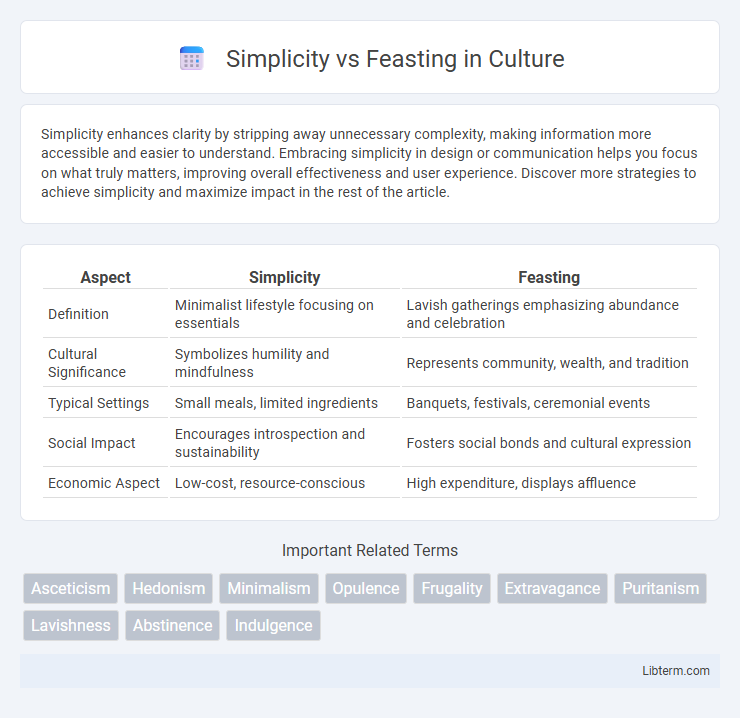Simplicity enhances clarity by stripping away unnecessary complexity, making information more accessible and easier to understand. Embracing simplicity in design or communication helps you focus on what truly matters, improving overall effectiveness and user experience. Discover more strategies to achieve simplicity and maximize impact in the rest of the article.
Table of Comparison
| Aspect | Simplicity | Feasting |
|---|---|---|
| Definition | Minimalist lifestyle focusing on essentials | Lavish gatherings emphasizing abundance and celebration |
| Cultural Significance | Symbolizes humility and mindfulness | Represents community, wealth, and tradition |
| Typical Settings | Small meals, limited ingredients | Banquets, festivals, ceremonial events |
| Social Impact | Encourages introspection and sustainability | Fosters social bonds and cultural expression |
| Economic Aspect | Low-cost, resource-conscious | High expenditure, displays affluence |
Understanding Simplicity: A Deeper Look
Understanding simplicity involves recognizing the value of minimalism in daily life, emphasizing clarity, intention, and purposeful choices. It fosters mental clarity by reducing distractions and allowing focus on essential priorities, promoting well-being and sustainability. Embracing simplicity often leads to enhanced contentment, balancing needs with mindfulness rather than excess.
The Appeal of Feasting in Modern Culture
Feasting in modern culture symbolizes celebration, abundance, and social connection, offering a sensory-rich experience that contrasts with the minimalist appeal of simplicity. Lavish meals and elaborate gatherings serve as expressions of status, tradition, and communal identity, driving a desire for indulgence in increasingly fast-paced lifestyles. This allure is reinforced by media and social platforms that glorify extravagant dining as a marker of success and enjoyment.
Historical Perspectives: Simplicity and Feasting Across Ages
Historical perspectives reveal that simplicity and feasting have long symbolized contrasting approaches to sustenance and social rituals. Ancient civilizations like the Greeks and Romans celebrated feasting as a display of wealth and communal bonding, while Eastern philosophies such as Buddhism emphasized simplicity and moderation as pathways to spiritual enlightenment. Archaeological findings indicate that hunter-gatherer societies favored simplicity in meals, reflecting resource availability and social structure, whereas agricultural societies developed elaborate feasting traditions linked to harvest celebrations and religious ceremonies.
Psychological Effects: Minimalism vs Abundance
Minimalism promotes psychological well-being by reducing decision fatigue and enhancing focus, leading to lower stress levels and increased contentment. In contrast, feasting or abundance can trigger sensory overload and decision paralysis, often resulting in anxiety and diminished satisfaction. The psychological effects of simplicity foster clarity and mindfulness, while abundance may lead to overwhelming cognitive load and decreased mental resilience.
Health Implications: Balanced Living or Overindulgence
Choosing simplicity in diet often leads to improved health outcomes by reducing processed foods and excess calories, thereby lowering risks of obesity, diabetes, and cardiovascular diseases. Feasting, when occasional and controlled, can support mental well-being and social bonding but habitual overindulgence contributes to inflammation, nutrient imbalances, and metabolic stress. A balanced approach integrating mindful eating patterns and nutritious food choices optimizes overall health and longevity.
Environmental Impact: Sustainability of Simplicity and Feasting
Embracing simplicity in lifestyle and food consumption significantly reduces environmental impact through lower carbon emissions, minimal waste, and decreased resource use, contributing to enhanced sustainability. In contrast, feasting often demands large quantities of food, increased energy consumption, and extensive food waste generation, which escalates ecological footprints and strains natural resources. Prioritizing sustainable practices such as locally sourced, plant-based ingredients in simple meals can mitigate environmental degradation more effectively than extravagant feasting traditions.
Financial Wellness: Cost of Simple Living vs Feasting Lifestyle
A simple living lifestyle typically reduces financial stress by minimizing expenses on luxury foods and extravagant dining, promoting savings and debt reduction. In contrast, a feasting lifestyle often leads to higher monthly costs due to frequent indulgence in expensive meals, impacting long-term financial wellness negatively. Prioritizing simplicity supports budget management and financial stability through controlled spending and mindful consumption habits.
Social Dynamics: Community in Simplicity and Celebration
Simplicity fosters social cohesion through shared daily rituals and mutual support, embedding community values in routine interactions. Feasting amplifies social bonds by creating heightened experiences that celebrate collective identity and cultural heritage. Both dynamics nurture community, with simplicity sustaining steady connections and feasting generating memorable social unity moments.
Finding Balance: Integrating Simplicity and Feasting
Finding balance between simplicity and feasting involves mindful choices that honor both restraint and indulgence. Embracing simplicity in daily meals supports health and clarity, while occasional feasting fosters celebration and social connection. Integrating these approaches creates a sustainable lifestyle where nourishment and enjoyment coexist harmoniously.
Practical Tips: Choosing Simplicity or Feasting in Daily Life
Choosing simplicity in daily life enhances mental clarity by minimizing distractions and reducing stress through decluttering and mindful consumption. Opting for feasting emphasizes celebration and abundance, encouraging balanced indulgence with nutrient-rich foods and meaningful social interactions. Practical tips include setting clear boundaries around spending, meal planning to balance enjoyment and health, and prioritizing experiences over excessive material accumulation.
Simplicity Infographic

 libterm.com
libterm.com